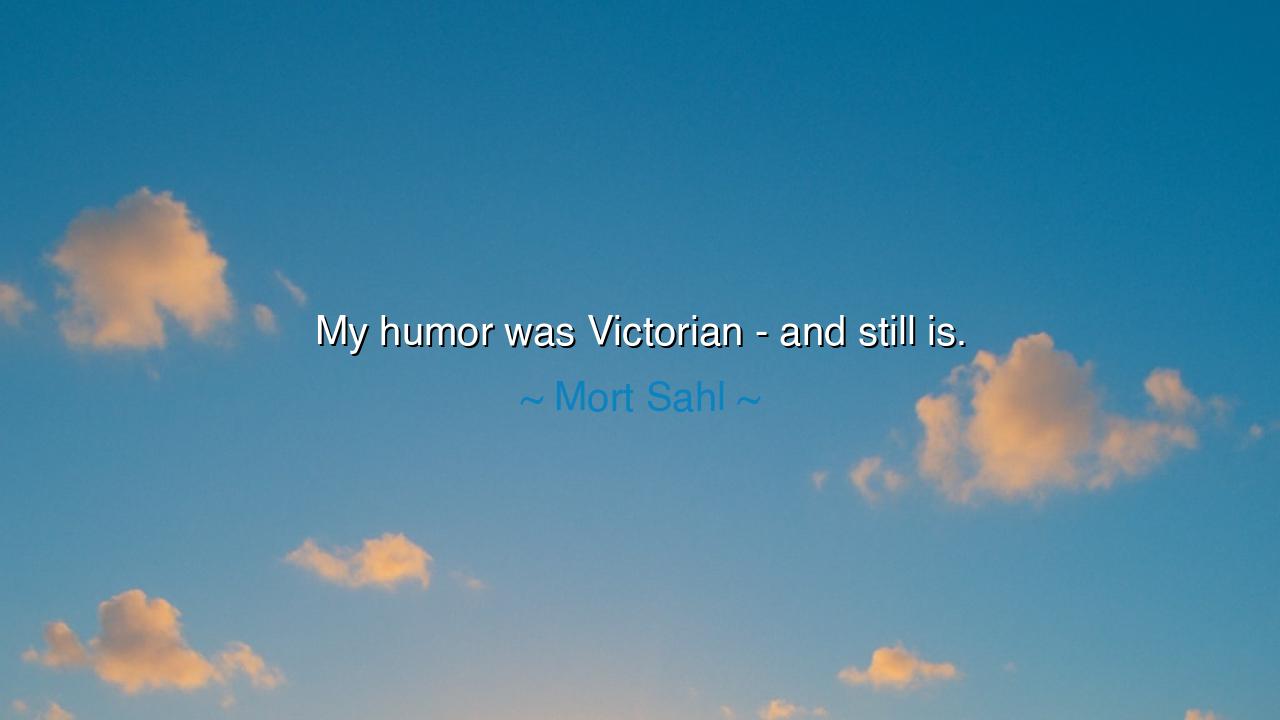
My humor was Victorian - and still is.






In the words of Mort Sahl, “My humor was Victorian — and still is.” At first glance, these words may seem to belong to a different age, a passing remark about style or taste. But within them lies a deeper wisdom — a declaration of fidelity to a timeless sensibility, to a form of humor that carries both wit and conscience, both intellect and restraint. To call one’s humor Victorian is to claim kinship with an era that prized the sharpness of the mind over the noise of mockery, the elegance of irony over the vulgarity of scorn. It is to speak of laughter not as a weapon, but as a mirror held up to society, polished by reason, morality, and subtle rebellion.
The Victorian era, though draped in lace and manners, was not without passion or daring. Beneath its formal surface flowed rivers of satire, irony, and reform. Writers like Oscar Wilde, Charles Dickens, and George Bernard Shaw wielded humor not to amuse alone, but to awaken the spirit. Their laughter had purpose — it sought to mend the cracks of hypocrisy, to reveal truth veiled in respectability. Mort Sahl, too, in invoking this spirit, aligned himself with those who believed that humor should illuminate rather than destroy, that its purpose was not to sneer, but to provoke thought. His words remind us that laughter, when born of intellect and empathy, becomes a tool for civilization itself.
To say one’s humor “still is” Victorian is to declare loyalty to refinement in an age of noise. It is a quiet defiance against the chaos of cynicism, the cheapness of cruelty disguised as comedy. Mort Sahl’s humor, much like that of the thinkers of old, carried a certain moral elegance — it exposed falsehood not through fury, but through clarity. He was, in his way, a knight of laughter, defending wit from the corruption of vulgarity. Such humor requires courage, for it demands not only intelligence but also restraint — to know how to jest without wounding, to mock without hatred, to teach without preaching.
Consider the example of Mark Twain, a man who, though not of the Victorian court, was kindred in spirit. Twain’s humor sparkled with irony, yet beneath his laughter burned a love for humanity and truth. He laughed at kings, preachers, and fools alike — but his laughter was the laughter of the wise, not the cruel. When he wrote of the Mississippi or of Tom and Huck, he revealed not only the folly of men but also the tenderness of their souls. In Twain’s pen, as in Sahl’s speech, humor was not mere entertainment — it was revelation, the voice of conscience wrapped in jest.
In this, there is a lesson for our age — an age that has too often mistaken mockery for wit and shock for insight. The ancients taught that speech has power; what we say shapes what we become. To laugh cruelly is to harden the heart, but to laugh wisely is to open it. The Victorians, for all their stiffness, knew this truth: that humor is not the enemy of virtue, but its companion. A jest can enlighten the soul as surely as a sermon, if it springs from compassion rather than contempt. Mort Sahl’s Victorian humor stands, then, as a reminder that the highest laughter is that which uplifts while it reveals.
There is something heroic in such humor — the courage to stand apart from the age, to speak truth wrapped in elegance, to provoke thought through grace rather than fury. Mort Sahl, by calling his humor Victorian, was not clinging to the past; he was preserving an ancient craft in modern form. His words summon us to reclaim the lost art of thoughtful laughter, to restore the sacred bond between wit and wisdom. For the jester, when noble, is also philosopher, and the laugh that stirs the mind is the laugh that endures.
So let this be the teaching carried forward: Let your humor be noble. Do not wield it as a blade to wound, but as a torch to enlighten. Read the old masters who made laughter a form of justice — Wilde, Twain, Shaw, Dickens — and let their rhythm shape your own voice. In conversation, in art, in life itself, seek the balance between grace and truth. For as Mort Sahl reminds us, humor that is Victorian — measured, intelligent, humane — does not age. It remains eternal, because it springs not from cruelty, but from compassion, not from vanity, but from vision. And such laughter, born of wisdom, will echo long after the jest is forgotten.






AAdministratorAdministrator
Welcome, honored guests. Please leave a comment, we will respond soon